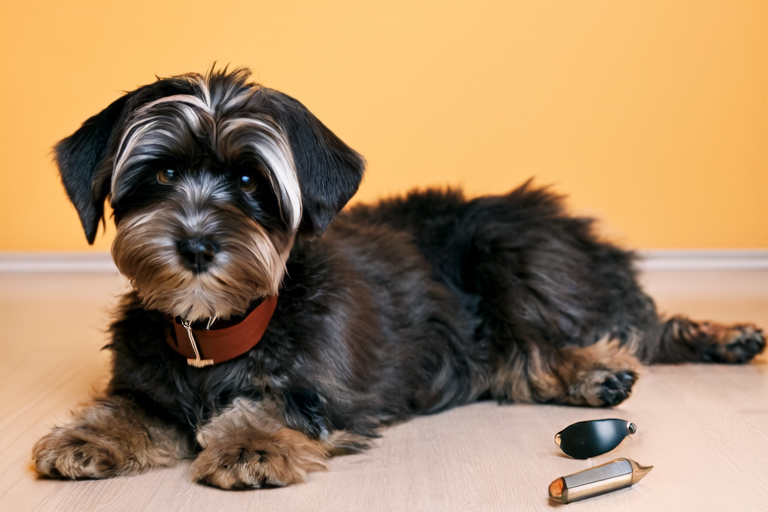Schnauzer: The Ultimate Guide to Grooming and Care
The Schnauzer is a popular breed known for its distinctive appearance and loyal nature. There are three main types of Schnauzers: Standard, Miniature, and Toy. Each has its own unique characteristics.
1. Schnauzer Varieties Overview
- Standard Schnauzer: This is the largest of the three breeds, standing between 18-20 inches tall and weighing between 35-50 pounds. They have a robust build with a wiry coat that can be either salt-and-pepper or solid black in color. Standard Schnauzers are highly intelligent, energetic, and protective.
- Miniature Schnauzer: Miniature Schnauzers stand between 12-14 inches tall and weigh between 14-20 pounds. Their coats come in various colors such as salt-and-pepper, black, and white. They are alert, friendly, and make excellent watchdogs.
- Toy Schnauzer: Toy Schnauzers are the smallest of the three breeds, standing no taller than 10 inches and weighing between 8-14 pounds. They have a wiry coat that can be salt-and-pepper, black, or white. Toy Schnauzers are playful, affectionate, and good with children.
2. Daily Care
Daily care for your Schnauzer includes regular grooming and bathing. You should brush your dog’s coat at least twice a week to remove any dirt or debris. When bathing your Schnauzer, use a mild shampoo and warm water. Avoid getting water in their ears or eyes. After bathing, dry your dog thoroughly to prevent skin irritation.
3. Hair Care
To maintain your Schnauzer’s signature look, you should regularly trim their hair. This will help keep their coat neat and tidy. It’s important to schedule regular grooming appointments with a professional groomer to ensure your dog’s coat remains healthy and well-groomed. Regular trimming also helps prevent matting and tangling.
4. Dental Care
Dental hygiene is crucial for your Schnauzer’s overall health. You should brush your dog’s teeth at least twice a week using a soft-bristled toothbrush and dog-specific toothpaste. In addition to brushing, you can give your dog dental chews or toys to help reduce plaque buildup. Regular dental checkups with a veterinarian are also recommended.
5. Ear Care
To prevent ear infections, you should clean your Schnauzer’s ears weekly using a cotton ball and ear-cleaning solution. Be sure to gently wipe the inside of the ear flap and the outer ear canal. Avoid inserting anything into the ear canal as this can cause damage. If you notice any signs of infection, such as redness, swelling, or discharge, consult a veterinarian immediately.
6. Nutritional Needs
Your Schnauzer requires a balanced diet that provides all the necessary nutrients for optimal health. High-quality commercial dog food or home-cooked meals that include lean proteins, whole grains, and vegetables are suitable options. Avoid feeding your dog table scraps or foods high in fat and sugar. Consult with a veterinarian to determine the appropriate portion sizes based on your dog’s age, weight, and activity level.
7. Common Health Issues and Prevention
Schnauzers are generally healthy dogs, but they can be prone to certain health issues. Some common conditions include hip dysplasia, diabetes, and urinary stones. To prevent these issues, provide your dog with proper nutrition, regular exercise, and routine veterinary care. Early detection and treatment can significantly improve your dog’s quality of life.
8. Training and Behavior Management
Training your Schnauzer is essential for developing good behavior and building a strong bond with your pet. Positive reinforcement techniques, such as treats and praise, work best when training your dog. Consistency is key when teaching commands and correcting bad behavior. Socialization from an early age can also help prevent behavioral problems.
9. Exercise Requirements
Regular exercise is important for maintaining your Schnauzer’s physical and mental health. Aim for at least 30 minutes of moderate exercise daily, such as walking or playing fetch. This will help keep your dog at a healthy weight and prevent boredom-related behaviors.
10. Coexistence with Other Pets
Schnauzers are generally friendly towards other animals, especially if socialized from a young age. However, they may show dominance over smaller pets due to their protective instincts. Supervision during introductions is recommended to ensure a smooth transition.
In conclusion, proper grooming and care are essential for keeping your Schnauzer happy and healthy. By following these guidelines, you can enjoy many years of companionship with your beloved pet.
